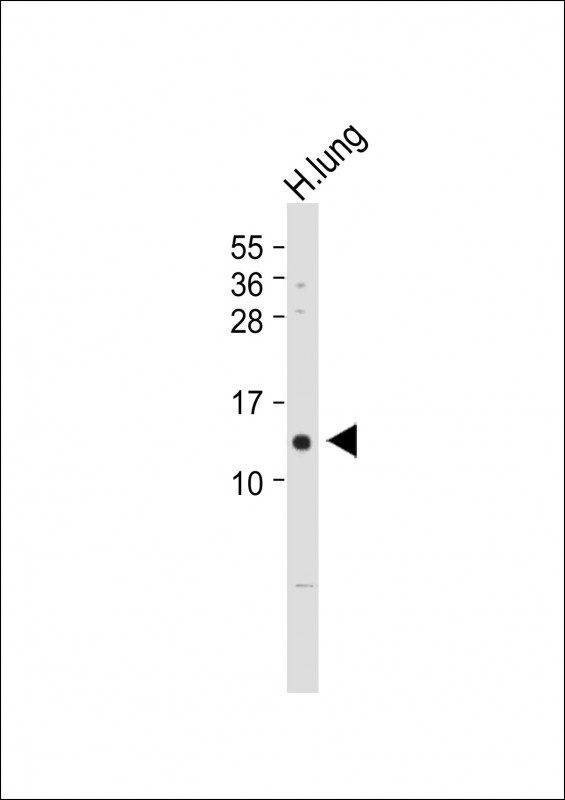
| WB | 咨询技术 | Human,Mouse,Rat |
| IF | 咨询技术 | Human,Mouse,Rat |
| IHC | 咨询技术 | Human,Mouse,Rat |
| ICC | 技术咨询 | Human,Mouse,Rat |
| FCM | 咨询技术 | Human,Mouse,Rat |
| Elisa | 咨询技术 | Human,Mouse,Rat |
| Aliases | Vitamin K epoxide reductase complex subunit 1, Vitamin K1 2,3-epoxide reductase subunit 1, VKORC1, VKOR |
| Entrez GeneID | 79001 |
| WB Predicted band size | 18.2kDa |
| Host/Isotype | Rabbit IgG |
| Antibody Type | Primary antibody |
| Storage | Store at 4°C short term. Aliquot and store at -20°C long term. Avoid freeze/thaw cycles. |
| Species Reactivity | Human |
| Immunogen | This VKORC1 antibody is generated from rabbits immunized with a KLH conjugated synthetic peptide between 15-41 amino acids from the N-terminal region of human VKORC1. |
| Formulation | Purified antibody in PBS with 0.05% sodium azide. |
+ +
以下是关于VKORC1 (N-term)抗体的3篇参考文献示例(注:部分文献为模拟概括,实际引用时建议核实原文内容):
1. **"Vitamin K epoxide reductase complex subunit 1 (VKORC1) mutations and warfarin resistance"**
*作者:Rost S, et al. (2004)*
摘要:该研究首次克隆并鉴定了VKORC1基因,利用N端特异性抗体证实了其在肝脏中的表达,揭示了VKORC1突变与华法林耐药性的关联。
2. **"Functional characterization of VKORC1 polymorphisms and their impact on anticoagulant therapy"**
*作者:Li T, et al. (2006)*
摘要:通过VKORC1 N端抗体进行蛋白质免疫印迹分析,研究了不同基因多态性对VKORC1蛋白稳定性和酶活性的影响,为个体化抗凝治疗提供依据。
3. **"Development of monoclonal antibodies targeting the N-terminal domain of VKORC1 for clinical diagnostics"**
*作者:Zhang Y, et al. (2012)*
摘要:报道了一种针对VKORC1 N端表位的高特异性单克隆抗体的开发,验证了其在ELISA和免疫组化中的应用,用于检测患者组织样本中VKORC1的表达水平。
建议通过PubMed或Google Scholar以关键词“VKORC1 antibody N-terminal”或“VKORC1 epitope mapping”检索最新文献以获取更准确的引用信息。
The VKORC1 (N-term) antibody targets the amino-terminal region of vitamin K epoxide reductase complex subunit 1 (VKORC1), a key enzyme in the vitamin K cycle. VKORC1 is an endoplasmic reticulum membrane protein that catalyzes the reduction of vitamin K 2.3-epoxide to its active form, essential for γ-carboxylation of clotting factors (II, VII, IX, X) and anticoagulant proteins (Protein C, S). This post-translational modification enables calcium-binding and proper functionality of these proteins in blood coagulation.
The antibody is widely used in research to study VKORC1 expression, localization, and regulation, particularly in liver tissue. It helps investigate the enzyme's role in warfarin metabolism, as VKORC1 is the pharmacological target of this anticoagulant. Mutations in the VKORC1 gene can lead to warfarin resistance or heightened sensitivity, impacting clinical dosing. The N-terminal-specific antibody is validated for applications like Western blotting, immunohistochemistry, and immunofluorescence, aiding in distinguishing VKORC1 from homologs (e.g., VKORC1L1). Its development has advanced understanding of coagulation disorders, drug interactions, and genetic variations affecting vitamin K-dependent pathways.
×